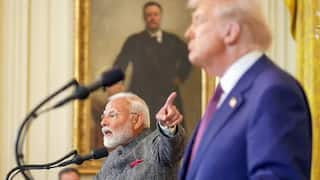Canada Didn’t Share 'A Shred Of Evidence' With India On Nijjar Case, Says Indian Envoy
India’s High Commissioner to Canada Sanjay Verma, who was withdrawn last week, has said the Justin Trudeau government has to share evidence that will be acceptable in the court of law on Khalistan activist Nijjar’s ongoing murder investigations

New Delhi: India’s High Commissioner to Canada Sanjay Verma, who was withdrawn by the government last week in the light of the growing diplomatic imbroglio between New Delhi and Ottawa over the ongoing investigations into the murder of pro-Khalistan Sikh radical Hardeep Singh Nijjar, has said no evidence was shared by the Canadian authorities that is acceptable in the court of law.
“We needed to see some evidence on the basis of which we can converse with our Canadian counterparts. Unfortunately, not a shred of evidence has been shared with us. Any evidence which is shared has to be legally acceptable. We are a country of rule of law and so is Canada. So therefore anything that is acceptable in the Canadian court of law, would also be acceptable in the Indian court of law. And, therefore, that evidence will work,” Verma told CTV, a Canadian news channel.
He said, no evidence whatsoever was shared by any Canadian official that can “lead us to a better spot” and that the Royal Canadian Mounted Police’s (RCMP) agenda to put the blame on Verma and Indian diplomats stating their alleged involvement in this was “pre-planned” and “politically motivated.”
Verma, who assumed charge as India’s envoy to Canada in November 2022, also said that the RCMP produced evidence and wanted to visit India immediately and hence visas could not be issued at the last moment without any proper planning.
Also Read: Opinion: India, Canada Need Quiet Diplomacy To Settle Row. New Delhi Can’t Risk Alienating Five-Eyes
“The most important case in hand from our point of view are the 26 extradition requests and so many other arrest requests. So we would think they are coming for that. They will hand over some of these people to us,” Verma, now back in Delhi, reiterated that the RCMP did not clarify the agenda as to why they wanted to visit India.
The RCMP in a statement on October 14 said, Indian government is not cooperating with Canada on their findings in the murder case.
“The Deputy Commissioner of Federal Policing, Mark Flynn, made attempts to meet with his Indian law enforcement counterparts to discuss violent extremism occurring in Canada and India, and present evidence pertaining to agents of the Government of India's involvement in serious criminal activity in Canada. These attempts were unsuccessful, therefore Deputy Commissioner Flynn met with officials of the Government of India, along with the National Security and Intelligence Advisor (NSIA), Nathalie Drouin, and Deputy Minister of Foreign Affairs David Morrison over the weekend,” said the RCMP.
The Ministry of External Affairs had said last week that India had shared the extradition requests with Canada regarding the gang members of the Lawrence Bishnoi criminal group. They are wanted in India on terror and other charges.
Last week, just as India decided to withdraw Verma and other diplomats from the mission there, Canadian Charge d'Affaires in India Stewart Wheeler, who has since been expelled by New Delhi, claimed that Ottawa provided proof of ties between "agents of the Indian government" and the murder of Nijjar.
Canada Did Not Respond To India’s Request For Evidence For 1 Year
Verma said India has been seeking the evidence from RCMP for the past one year but there has been “no movement” from the Canadian law and order officials.
“Why this movement now?,” Verma said, adding, “What is it they want to talk about? Unless that agenda is clarified how do I get my people (to talk)? … My core concern (is the extradition requests).”
Verma and other senior diplomats had been named as “persons of interest” in the murder of Nijjar, which led to nose-diving of bilateral ties between India and Canada.
Responding to these allegations Verma said, “Nothing at all. No evidence presented. Politically motivated. And more or less, if Mr. Trudeau and his colleagues know about it, is it not a crime not to file a chargesheet, is it not a crime to go for the judicial process?”
“I want to know the evidence but there has to be a way in seeking those evidence and there has to be a way in confirming … We do (want to know) what pro-Khalistani elements in Canada are doing. That’s my national interest. That’s my core concern with Canada,” said Verma.
“There is nothing covert. It is all overt,” he said, adding that India has “never” supported Nijjar’s murder and that he “condemns” his killing. “Any murder is bad … But we have to get to the bottom of the issue.”
Nijjar, 45, was killed outside a Gurdwara on June 18, 2023, in Surrey, British Columbia.
“We are committed not to do extra judicial killings in any territory, leave alone a foreign country.”
On being asked about the case going on in the US concerning a plot to kill Khalistan leader Gurpatwant Singh, Verma said, “Indictment is not a conviction and therefore logically it will follow a judicial process. So much so that we have formed a high level committee for that.”
“Canada did not follow the practice which should have been there,” said Verma.
On the future of the India-Canada bilateral ties, Verma said, “On the basis of intelligence (inputs) if you want to destroy a relationship, be my guest.”
Related Video
Punjab News: AAP Leader Shot Dead During Wedding in Amritsar






































